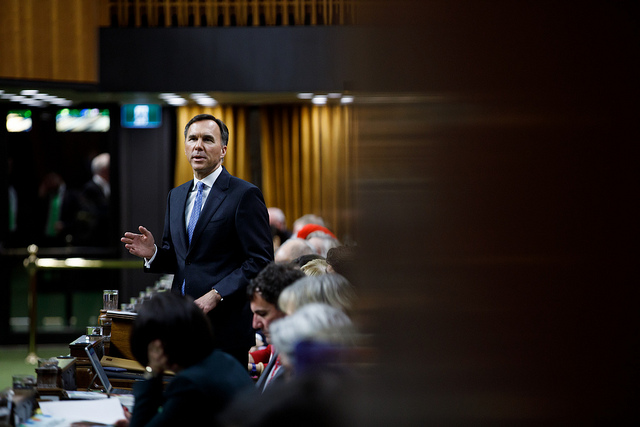This year’s budget allocates resources to continue to deliver on a fundamental mandate Canadians gave the federal government in 2015: protect the environment and grow the economy. Canadians are concerned about the immediate and future effects of climate change. They know that action commensurate with the scale of this challenge is key to securing their well being today, and tomorrow. Canadians across the country have felt the impacts of climate change in the devastating heat waves and raging wild fires of last summer and have paid the costs to communities and homes. Since returning from the Paris climate summit in 2015 where Canada joined nations of the world in signing the landmark agreement, the Canadian government has been consulting with industry, environmental organizations like the Pembina Institute, and civil society to deliver, develop and implement Canada’s first ever truly national climate plan – the Pan-Canadian Framework on Clean Growth and Climate Change (PCF). A comprehensive plan of 50 measures to protect our health while building a strong economy.
Cleaner vehicles at lower costs for Canadians
In the 2017 and 2018 budgets, we saw dollars allocated to implementing important tenets of the PCF like a national coal phase-out, methane regulations, a national price on carbon pollution, and a clean fuels standard. Building on unprecedented efforts, the 2019 budget will enable the implementation of another PCF pillar; the development of a zero emissions vehicle (ZEV) strategy. The budget reiterates the government’s commitment to have ZEVs make up 10% of Canadian vehicle sales by 2025, 30% by 2030 and contains new investments to remove current barriers to increased clean vehicle purchases, as featured in the Green Budget Coalition’s 2019 recommendations, of which the Pembina Institute is a member. These include: $130m over five years to deploy recharging and refueling stations; $5m over five years to work with auto manufacturers to secure ZEV sales targets to make sure sufficient inventory are available to Canadians; and $300m over three years for purchase incentives of up to $5,000 — in addition to existing provincial support. Canadians who invest in ZEVs will benefit from 100% accelerated capital cost allowance, a significant measure to help electrify company and public institution vehicle fleets.
This is great news! Approximately one quarter of Canada’s GHG emissions originate in the transportation sector. We need a smart strategy that helps more people buy clean cars not only to reduce harmful emissions, but also to strategically position the entire auto manufacturing industry to grow with the global transition to electric vehicles.
More comfort and lower bills through energy efficient buildings
The buildings sector offers some of the lowest-cost emission reduction opportunities, and some of the highest economic returns in the form of job creation, GDP stimulus, and co-benefits to Canadians. This year’s budget makes smart investments in this hidden fuel that is energy efficiency; $1.01 billion in 2018–19 to increase energy efficiency in residential, commercial and multi-unit buildings to be delivered by the Federation of Canadian Municipalities through the Green Municipal Fund. This includes financing and grants to retrofit community buildings, financing for municipal initiatives to support home retrofits, and financing for affordable housing developments to improve energy efficiency and support on-site energy generation. This will make a big difference for those who have been thinking about better insulating their house or installing a solar rooftop installation.
Better energy data for better informed public policy
High quality energy data and analysis are a critical component of good, informed public policy and a key resource for supporting economic competitiveness. We welcome this year’s investment of $15.2m over five years to establish a Canadian Centre for Energy Information delivered by Statistics Canada. Whether the goal is to re-envision freight transport or to support innovative clean technologies, this investment will contribute to ensuring that Canadians have access to timely, complete, and independent energy data and analysis. A healthy economy in the digital age requires credible, publicly available data in order to be competitive. A one-stop shop delivering such data will support innovation in our energy sector and the Canadian economy at large. Ultimately, this investment will allow for designing and implementing a successful energy transition in Canada.
Building Canadian municipalities’ capacity to tackle climate change
Municipalities are on the front lines of tackling climate change, and this year’s budget invests in municipalities so that they are equipped with the community building tools and resources to lower emissions. We support the federal government’s top up of $2.2 billion to infrastructure through the gas tax fund. Municipalities have historically put a large portion of their gas tax allocation towards public transit and we support and encourage municipalities to keep making strategic transit investments including low carbon transit vehicles that increase transit ridership, drive down traffic congestion and help meet municipal GHG reduction targets.
Building on three years of unprecedented efforts on climate in Canada
These welcomed announcements build on the progress achieved over the past years. While we know that we’ll need to work together to do more to align with what science says is necessary to avoid the worst of climate change, let’s take a moment to celebrate a few of our recent wins on climate.
- Firstly, as of Jan. 1, 2019, carbon pollution is no longer free. Despite what some will have us believe, putting a price on a pollution is a key building block in a comprehensive plan to tackle our most pressing challenge at the lowest cost. It makes clean technologies and renewable energy even more attractive and affordable, driving demand, growth and jobs in these sectors. Importantly, it’s a fair way to hold polluters to account without compromising industry competitiveness while returning all collected revenues to Canadian families, small and mediums enterprises, and institutions like hospitals and schools.
- Secondly, coal-fired power will be phased out by 2030. This is a momentous step in protecting public health and sending a signal for clean energy investments. Conjointly, as a result of the work done by the Just Transition Task Force, launched a year ago, the government is now equipped with recommendations to support coal workers and their communities to support a just and fair transition for Canadian coal power workers. Some of these are reflected in the 2019 budget including the creation of a $150m infrastructure fund, starting in 2020–21, to support economic diversification.
- Thirdly, the oil and gas sector must now implement measures to reduce methane emissions — the key ingredient in natural gas and a powerful greenhouse gas — in their operations. In addition to reducing emissions in the largest emitting sector, the new federal regulations on methane will turn currently wasted energy in revenues for companies.
By working together, Canadians have achieved a great deal on implementing the climate plan by guiding upcoming investments, promoting innovation and helping businesses invest in future-proof sustainable technologies and avoid being left behind. Now we have to monitor progress and impacts of this ongoing effort to inform short term decisions while keeping an eye to our long term objectives. Towards this goal, the Canadian government committed $20m for the creation of an accountability mechanism in last year’s budget. The government has since put out a call for proposal for the creation of the Climate Institute to provide credible and independent advice to governments on key policy questions and tools to reach our climate and clean growth objectives. We look forward to seeing the Climate Institute taking shape in a way that ensures ongoing and transparent evaluation and accountability for meeting our climate targets and increasing our ambition.
With last summer’s wildfires and heatwaves reminding us of our vulnerability to climate change, we welcome the federal government’s ongoing commitement to action. This year’s budget keeps us on a steady implementation path and continues to highlight how Canadians can work together to grow an inclusive, low carbon economy that is already emerging, here and around the globe. As Canadians head to the polls in October, they will look to see how party leaders envision to continue this important work and dial up the ambition – whether for themselves, their child who will have just entered the job market after graduating, or their grandaughter who will have just started school.










